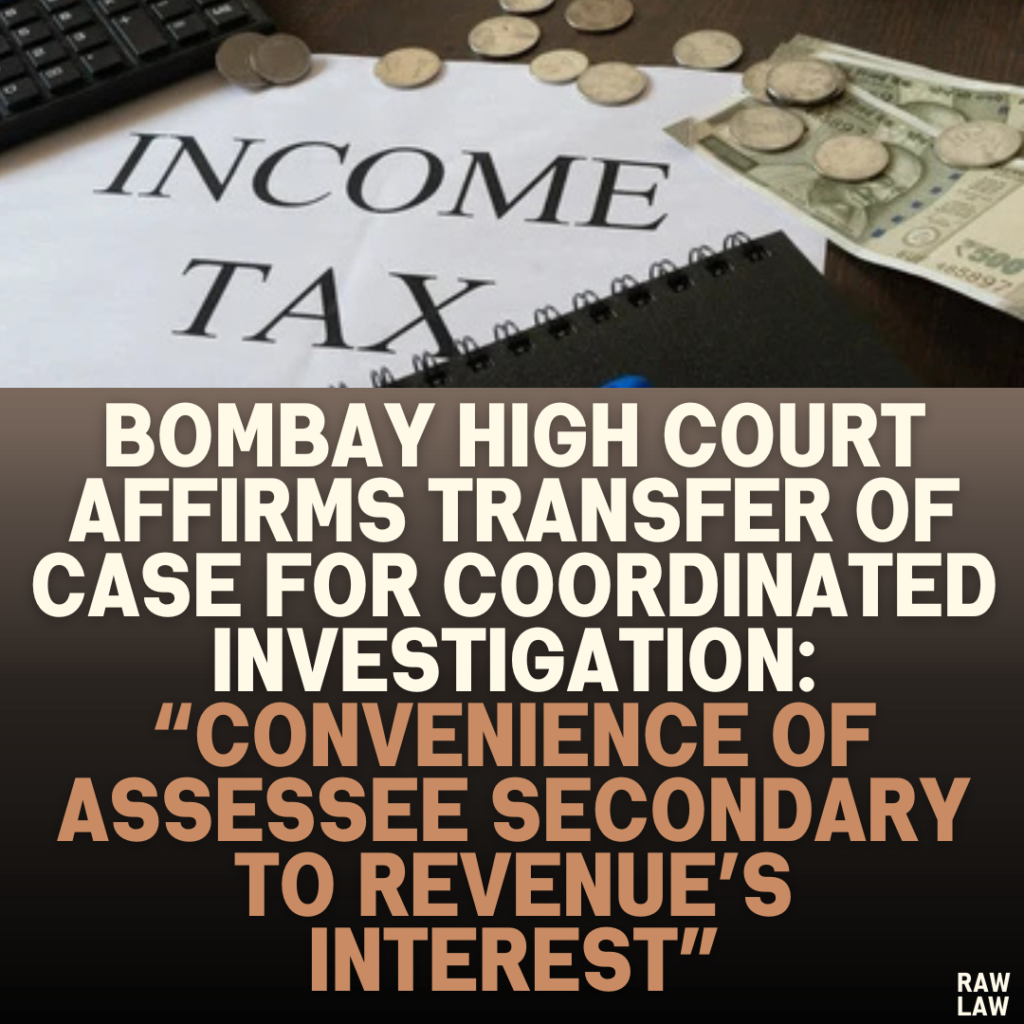Court’s Decision
The Bombay High Court dismissed the petitioner’s writ challenging the transfer of its case from Mumbai to Delhi under Section 127(2) of the Income Tax Act, 1961. The court held that the transfer was legally justified, supported by adequate reasoning, and fulfilled procedural requirements. It emphasized that a centralized investigation served the larger public interest in protecting revenue.
Facts
- The petitioner’s case was transferred from the jurisdiction of Mumbai tax authorities to their counterparts in Delhi through an order dated February 22, 2023. The transfer was part of a larger initiative involving about 46 assessees associated with the “Pacific Group” for coordinated investigations into alleged financial irregularities.
- The petitioner alleged that the transfer order was arbitrary and devoid of proper reasoning. It argued that the absence of agreement between the Commissioners in Mumbai and Delhi violated the statutory requirements of Section 127(2)(a) of the Income Tax Act.
- The transfer, according to the respondents, was necessitated by the need for centralized and coordinated assessments concerning the Pacific Group’s alleged bogus transactions and evasion of taxes.
Issues
- Reasoning: Did the transfer order satisfy the requirement of providing sufficient reasons as mandated under Section 127(2)?
- Agreement: Was there a valid agreement between the Mumbai and Delhi Commissioners, as required under Section 127(2)(a)?
- Natural Justice: Was the assessee given a reasonable opportunity to be heard before the transfer?
Petitioner’s Arguments
- Lack of Reasons: The petitioner contended that the order lacked reasoning, violating both the statutory mandate and principles of natural justice.
- No Agreement: It argued that there was no agreement between the Mumbai and Delhi Commissioners, making the order procedurally invalid.
- Reliance on Precedent: The petitioner cited Noorul Islam Educational Trust v. Commissioner of Income Tax-I (2016) to emphasize the necessity of documented agreement and conscious application of mind by the Commissioners.
Respondent’s Arguments
- Adequate Reasoning: The respondents maintained that the order provided sufficient reasons, including the need for centralization to protect revenue.
- Agreement Established: Agreement between the Commissioners was substantiated through communications exchanged prior to the order, fulfilling the statutory requirement.
- Coordination Imperative: Coordinated investigation of the Pacific Group was essential due to the interlinked nature of transactions, ensuring a fair and effective tax assessment.
- Technological Advances: Modern technology minimized inconvenience to the petitioner, addressing their objections about traveling to Delhi.
Analysis of the Law
- Section 127(2) Requirements:
- An agreement between the Commissioners involved.
- A reasonable opportunity for the assessee to present objections.
- Recording of reasons for the transfer.
- Agreement was established through correspondence between the Commissioners.
- The petitioner was heard, and objections were considered.
- The impugned order detailed reasons for the transfer, including the necessity for a coordinated investigation.
- Natural Justice: The petitioner was afforded an opportunity to object and present clarifications, fulfilling the principle of audi alteram partem.
- Reasons and Convenience: The court highlighted that reasons need not align with the petitioner’s convenience if they serve a broader public interest, such as protecting revenue.
Precedent Analysis
The court distinguished this case from Noorul Islam Educational Trust:
- In Noorul Islam, there was no documented agreement or conscious application of mind by the Commissioners.
- In the present case, the Commissioners explicitly agreed, as evidenced by their communications dated December 8, 2022.
The court noted that Noorul Islam turned on its own facts and was not applicable in this instance.
Court’s Reasoning
- Reasons Provided: The court found that the transfer order adequately recorded reasons, such as the need for centralized assessment to ensure a fair investigation into the alleged bogus transactions linked to the Pacific Group.
- Agreement Between Commissioners: Correspondence between the Commissioners evidenced their agreement to the transfer.
- Modern Solutions for Convenience: The order addressed the petitioner’s concerns by noting that technological tools could minimize physical appearances, thus reducing inconvenience.
- Revenue’s Interest Over Convenience: The court emphasized that the assessee’s convenience must yield to the greater public interest in ensuring a comprehensive and coordinated investigation.
Conclusion
The court dismissed the petition, finding no merit in the petitioner’s contentions. It upheld the transfer order, reasoning that:
- Adequate reasons were provided in the impugned order.
- The procedural requirements of Section 127(2) were fully satisfied.
- Coordinated investigations were necessary to protect revenue.
The petition was dismissed without costs, and any interim relief granted earlier was vacated.
Implications
- Strengthening Revenue Protection: The judgment affirms that coordinated investigations, even at the cost of assessee inconvenience, are crucial for tackling complex financial fraud.
- Technology and Justice: The court highlighted the role of modern technology in reducing practical difficulties during cross-jurisdictional investigations.
- Importance of Procedural Compliance: The judgment underscores the need for adherence to procedural safeguards, including reasoned orders and proper documentation of agreements.




Pingback: Supreme Court Reiterates Strict Limitation Rules for Arbitral Award Challenges: "No Extension Beyond 30-Day Condonable Period Under Section 34(3)" - Raw Law